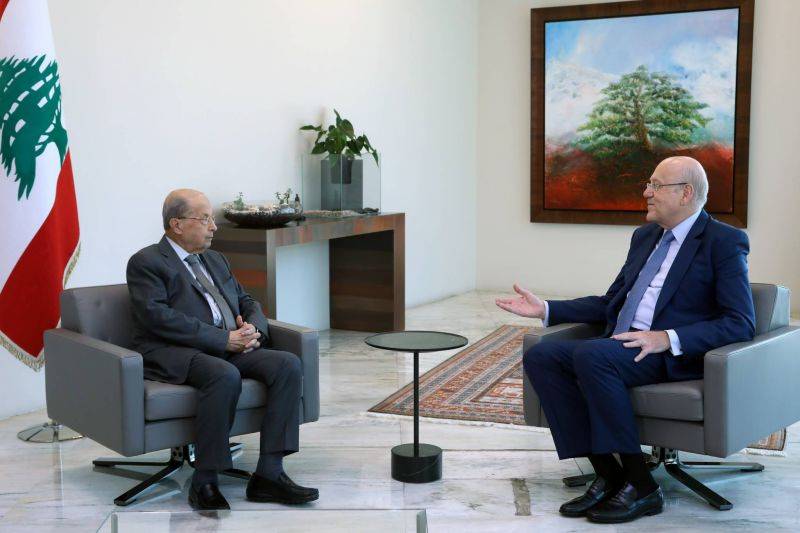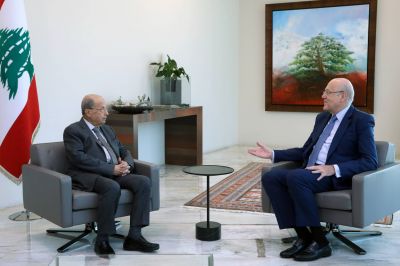
Prime Minister-designate Najib Mikati (right) speaking with Michel Aoun in Baabda. (Credit: Dalati & Nohra)
The head of state does not give up.
Just when we thought we had gotten to a final sprint in the cabinet formation process, President Michel Aoun pulled out a tremendous weapon in his standoff with Prime Minister-designate Najib Mikati: the removal of the governor of the central bank, Riad Salameh, a commitment that the president seeks to obtain from the prime minister-designate as part of the negotiations to form a government.
The search warrant that Mount Lebanon Public Prosecutor Ghada Aoun issued against Salameh two days ago is undoubtedly the new sword of Damocles that Baabda is brandishing to force Mikati to cave.
Reports that only a few final touches remained to be agreed upon before the cabinet sees the light turned out to be a false alarm — several obstacles have yet to be overcome — while Michel Aoun played his trump card at a time when international pressure is mounting.
We have learned, among other things, that France, which continues to push for a solution, albeit discreetly, increased its pressure a few days ago. Meanwhile, the president, who continues to wage his political battles as if nothing is happening, seems to be relying on the judiciary to achieve his goal.
This is how Ghada Aoun, who is known for being close to the Aounists, once again took measures against the BDL governor.
Aoun pressed charges against Riad Salameh on April 7 in relation to bank transfers from Lebanon and for acts related to money laundering. The prosecutor contended that these transfers were “responsible for the collapse of the Lebanese lira.”
Back to square one
Michel Aoun’s desire from the beginning was to confront Riad Salameh, a topic that has been a hobby-horse of his for years. Thus, he has worked nonstop, especially since the financial meltdown, to dismiss the central bank chief.
However, he needed the prime minister-designate’s assistance to be able to achieve that, as only a resolution by the cabinet could remove Salameh from his post.
The president had previously tried to accomplish this via Saad Hariri, a close friend of the governor, before his attempt with Najib Mikati, but it was to no avail. The latter, who is part of the Sunni club of former heads of government, has not yielded yet and probably will not.
The United States does not seem ready either to throw Mr. Salameh to the wolves — he who has collaborated well with them on all the sensitive dossiers related to money laundering and other topics — unless there is solid evidence of corruption and embezzlement against him, as a source in Washington says.
The legal action taken against the governor is a maneuver, serving as a more effective winning card in the eyes of Baabda, particularly since Mr. Salameh has become very unpopular among the Lebanese since the start of the financial crisis. This will be especially beneficial to Aoun, as it serves as a pressure tool when negotiating — from a position of strength — his quotas and the balances of power within the next cabinet.
The umpteenth visit by the Prime Minister-designate yesterday to Baabda is proof of this. With a scowl on his face, Najib Mikati, who presented to the head of state a complete line-up inspired by previous talks, came out empty-handed, failing to extract any concessions than in last visit, or the one before. On the contrary, there are now more hurdles, several sources said.
According to our correspondent in Baabda, Hoda Chedid, there are five pending issues: the first one regards the post of the deputy prime minister, which according to information obtained by the local news station MTV, could be entrusted to Syrian Social Nationalist Party member Wadih Chami.
The Interior and Justice ministry portfolios, which have been hindering the formation process since the beginning of the talks, and even when Saad Hariri tried his luck, persist. The Social Affairs and the Economy ministry portfolios are also a challenge. There are differences emerging regarding the candidate who will be appointed minister of telecommunications, although it is known to everyone that the Marada movement seeks this portfolio. This displeases the head of state, who is at loggerheads with the head of this Christian party.
In short, the most recent meeting between Mikati and Aoun gives the impression that the situation is almost back to square one. That is true particularly since even the quota distribution between the different political parties could be called into question if the prime minister and the president fail to agree on the ministers.
According to a political analyst close to the March 14 coalition, there is an even more serious issue related to two Christian ministers whom the head of state insists on appointing himself. This would mean a return to the issue of the “blocking third,” which undermined all the efforts that Saad Hariri made in nine months.
During their one-on-one meeting, new ministerial suggestions would have been put forward by both sides to close the gap between their positions, according to sources close to Baabda, who remain cautious so as not to give the impression of being the gravediggers of the cabinet formation effort.
This article was originally published in French in L’Orient-Le Jour. Translation by Joelle El Khoury and Sahar Ghoussoub.
